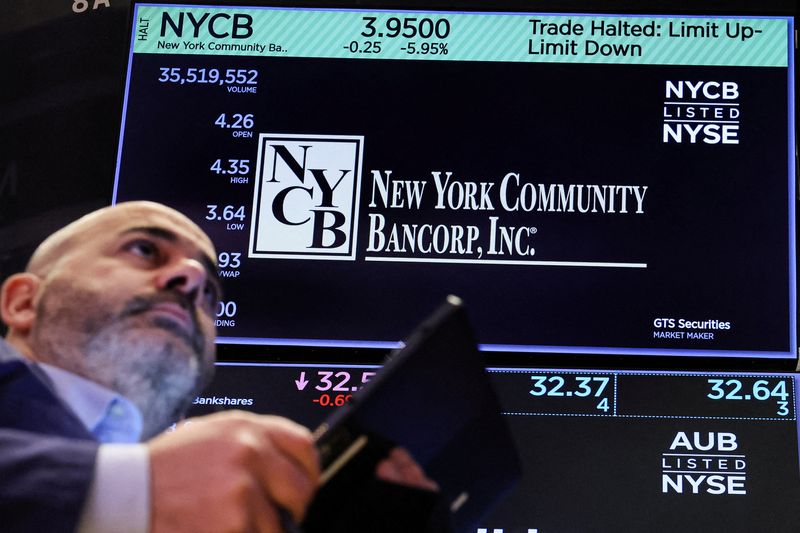Investing.com -- New York Community Bancorp (NYSE:NYCB) stock has plunged more than 60% since the beginning of the year, with shares plumbing their lowest levels in decades.
The company has faced several headwinds, with its share price plunging in late January after it reported an unexpected fourth-quarter loss. In addition, its share price decline was accelerated amid concerns over its loan exposure.
New York Community Bancorp Stock
The January 31 earnings release pushed NYCB shares more than 37% lower to $6.47 per share. However, they have continued to decline since then, currently trading at around $3.50 per share. They are down 66% so far in 2024.
Zooming out, NYCB shareholders have had an extremely tough year, with the stock down 59% over the last 12 months and 70% in the last six months.
Morgan Stanley (NYSE:MS) recently cut its NYCB price target to $4 from $6 per share, while Citi lowered its target for the stock to $3.50 from $5 per share in a recent note.
The recent NYCB share price slide could have been worse, with the stock following as much as 40% on Wednesday following reports that it was seeking a financial boost. It did manage to recover and close the session 7% higher in reaction to news that the company announced a $1 billion cash infusion from a group that includes former Treasury Secretary Steven Mnuchin.
Steven Mnuchin’s NYCB Equity Grab
The embattled lender received a crucial financial lifeline on Wednesday, securing a cash infusion of over $1 billion. Liberty Strategic Capital, led by ex-Treasury Secretary Steven Mnuchin, contributed a $450 million share of the cash.
The rest came from Hudson Bay Capital, Reverence Capital Partners, and Citadel Global Equities, as well as other institutional backers and certain executives of the bank.
In the aggregate $1.05 billion equity fundraising, NYCB will allocate shares of common stock and convertible preferred stock at a price of $2 per share, with investors granted 60% warrant coverage for acquiring non-voting stock equivalents at an exercise price of $2.50 per share.
Reacting to the news, Morgan Stanley said the equity raise “fortifies capital to help manage further pressure on CRE.” However, they still see several risks around office/multifamily losses, potential loan sales, and funding costs.
Analysts at Citi stated they view the $1.05 billion investment and appointment of CEO Joseph Otting as “incrementally positive” but feel that without an update on deposit balances and the absence of a strategic plan from management, “there is still a lot of uncertainty.”
Bank of America (NYSE:BAC) noted that new CEO Otting worked with Mnuchin on the turnaround of failed bank IndyMac (rebranded as OneWest) post the Global Financial Crisis. The bank was eventually sold to CIT.
DA Davidson analysts said there is still a lot of uncertainty, but the “much-needed lifeline” shores up the capital, and they expect the new board will be aggressive in marking the loan portfolio as it would be able to absorb much higher credit loss.
On Thursday, NYCB disclosedt held deposits of $77.2 billion, around 7% below the $83 billion it had on February 5. The bank also revealed its strategic initiatives for the year, which include reducing its commercial real estate exposure.
Is NYCB a good investment?
Overall, analysts feel the cash infusion was well-needed. However, they are generally cautious about the stock overall, with uncertainty still ahead.
Morgan Stanley highlighted other positives but maintained an Equal Weight rating on the stock in its note. The firm said, “We don't think that the issues facing NYCB change the trajectory or pull forward the cycle; it just refocuses the market on an ongoing risk for the group.”
Citi kept a Neutral rating on the stock, stating there is “a lot of work ahead.” Furthermore, the firm sees better opportunities in the space and prefers to wait and see how well the new team executes.
BofA also maintained a Neutral rating on the stock, believing the current risk/reward is balanced.
For DA Davidson, “there is still a lot of uncertainty on the level of deposit outflows and potential for turnover with private bankers.”
The firm wrote, “We continue to view valuation as untethered from fundamentals and reiterate Neutral & $4 PT.”
Learn more about the best Bank Stocks
If you’re an investor who is interested in diversifying your portfolio with some bank stocks, our Top Bank Stocks discover page will help you to identify and compare the top bank stocks based on various financial metrics. Analyze the latest stock prices, dividend yield, market capitalization and earnings per share to gain insight into each bank's financial health.
